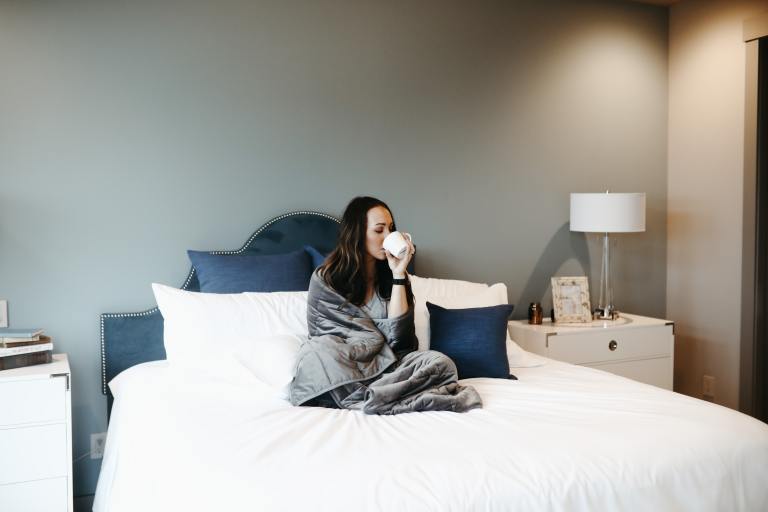
10 Herbs for Menstrual Cramps: Periods Aren’t as Painful When Taking These
Cramping can be calmed by chamomile tea, which is packed with anti-inflammatory substances.
One of the worst symptoms of PMS is recurring, painful cramps. Menstrual cramping is caused by too many prostaglandins in the bloodstream, which are compounds that are released from the uterine muscle as it is preparing to shed. Prostaglandins will cause a uterine contraction so that the endometrium can detach and flow out of the body.
Menstrual cramps, also known as primary dysmenorrhea, occur during or before menstruation. However, secondary dysmenorrhea involves period pain from uterine fibroids. This is much more painful than a normal menstrual cramp.
Although any cramp — caused by premenstrual syndrome or menstruation — can be uncomfortable, the pain can be reduced with pain medication. Mefenamic acid, for instance, is an anti-inflammatory drug that will reduce period cramps. It can also reduce blood flow and blood loss from menstrual bleeding.
However, drugs are not the only option when dealing with a painful period. Herbal remedies are also effective against symptoms. Below, there are multiple herbs for menstrual cramps so every woman can stay comfortable during that time of the month:
1. Ginger Tea
Ginger is known for its anti-inflammatory properties, which is why ginger tea, ginger capsules, or ginger root powder is commonly used to reduce period pain. This herb will reduce the production of prostaglandins in order to alleviate more than one PMS symptom. In addition to reducing cramps, it will also lessen mood swings and headaches. It can also treat morning sickness, lower blood sugar, combat indigestion, and lower cholesterol levels. Overall, ginger is incredibly helpful because it can solve multiple menstrual symptoms at once.
2. Essential Oils
The best essential oil to use for period cramps is either lavender oil, which can reduce discomfort, or cinnamon oil, which can reduce inflammation. Both options will provide pain relief in a short period of time. However, they have different additional benefits. Lavender oil can improve circulation, ease joint pain, boost mood, reduce acne, ease anxiety, and keep hair healthy. Meanwhile, cinnamon oil can reduce stress, fight off infections, and even protect against insects. If neither of these oils is sufficient for someone’s symptoms, rose oil is another, lesser-known option. It promotes sleep, eases anxiety, and provides pain relief for cramps.
3. Lemon Balm Tea
Lemon balm tea is a type of herbal tea with antioxidants that can lower oxidative stress and inflammation. This natural remedy will prevent painful menstruation on a monthly basis. However, lemon balm can also calm anxiety, treat insomnia, improve concentration, and battle inflammation. Lemon balm tea is one of the best types of herbal medicine because it is capable of doing much more than simply reducing period cramps. It has countless benefits — and it is easy to make. Simply chop up 1/4 cup of fresh lemon balm leaves, mix it with a hot cup of water, and allow it to steep for ten minutes. Then add a teaspoon of honey for flavor.
4. Chamomile Tea
Cramping can be calmed by chamomile tea, which is packed with anti-inflammatory substances. It enhances the menstrual flow in order to lessen pain during the menstruation cycle. Chamomile is also known for promoting sleep, reducing stress, reducing acne, and boosting immunity. Plus, it is a digestive relaxant that can help reduce stomachaches, even when the menstrual period comes to an end.
5. Peppermint Tea
Peppermint is a muscle relaxant, so drinking peppermint tea will lessen (or even prevent) cramps. Tea is an excellent menstrual pain reliever because it has fewer side effects than over-the-counter drugs, which have the potential to cause bloating, gas, vomiting, dizziness, or a rash. In fact, peppermint actually has additional benefits, like fighting bad breath, aiding digestion, promoting sleep, relieving clogged sinuses, increasing energy, and boosting immunity.
6. Cramp Bark Tea
Cramp Bark and Black Haw Tincture have an anti-spasm effect on the uterus. This medicinal herb will help the body relax and relieve menstrual cramps, which will reduce a person’s dependency on over-the-counter medications. In addition to providing period pain relief, it also works as a muscle relaxer. This product is vegan and gluten-free without the harsh bite of alcohol. It can be swallowed on its own or it can be dropped into a cup of hot water in order to create cramp bark tea.
7. Chinese Herbs
A handful of scientists have claimed that Chinese herbal medicine can reduce menstrual pain even better than over-the-counter medication. These herbs include angelica root, fennel fruit, licorice root, cinnamon bark, and red peony root. No matter which Chinese herb is ingested, it should successfully treat dysmenorrhea symptoms. However, if they are not effective, acupuncture is another big component of Chinese medicine. Acupuncture involves sticking needles into pressure points, such as the four gates associated with Liver Qi Stagnation. The process of acupuncture should also ease pain from cramping.
8. Red Raspberry Leaves
Red raspberry leaves are rich with vitamins and minerals, like potassium, magnesium, zinc, phosphorus, and iron. A red raspberry leaf also contains fragarine, which tones and tightens pelvic muscles. Cramping is caused by these muscles spasming, so consuming red raspberry leaf tea can combat pain and prevent painful menstrual cramps. Not only does it support healthy menstruation, but European and Native American women have been using these leaves for thousands of years in order to prepare for healthy childbirth.
9. Pycnogenol Extract
Pycnogenol is a plant extract that comes from a pine tree in the southwestern region of France. This herb contains antioxidant compounds that will reduce the need for pain medication. It is also taken to deal with asthma, ringing ears, osteoarthritis, and ADHD. Some people also use skin creams containing pycnogenol for its anti-aging effect. However, it is most commonly used for endometriosis and painful periods which can cause severe pelvic pain in women.
10. Fennel Seeds
Fennel contains anethole, which has anti-spasm effects. This will make each cramp hurt less during the menstrual period. It could even get rid of primary dysmenorrhea completely. Fennel also has anti-inflammatory properties, antifungal activity, and works as an antioxidant. That means it can help regulate blood pressure, clear up acne, reduce constipation, and limit asthma symptoms. Overall, eating fennel seeds or drinking fennel tea is beneficial to a woman’s health during her menstrual cycle. ![]()











